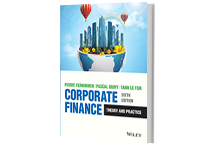Comment, question or quotation of the day
10-05-2025 : KKR - Capital Group: engagement before marriage?
Capital Group is one of the world's leading asset managers. Based in Los Angeles, it manages $2,800 billion, mainly through active management on behalf of tens of millions of individual investors. As examples, it owns 16.6% of Publicis, 10.3% of ASML Holding and 13.8% of BAT.
As with all active managers, the rise of passive management is a very real threat. While Capital Group has multiplied its assets under management by 2 since 2016, Vanguard, the pioneer of passive management, has multiplied them by 3 over the same period to $10,500 billion. With management fees of 0.07% of assets under management, Vanguard has commercial arguments that Capital Group does not have.
Private debt - i.e. unlisted debt, which is often more profitable because it is riskier than listed bonds - is a way of combating passive management by increasing the rates of return available to clients. But just because you manage $555bn in listed bonds doesn't mean you're comfortable with private debt.
KKR was born in LBOs, but has long diversified into all types of investments: infrastructure, real estate, . . . and private debt ($100bn out of $600bn of assets under management). Joining forces with Capital Group means finding new resources: the countless individuals that Capital Groupe serves via 200,000 independent financial advisors. It is true that in 40 years institutional investors have had time to convert to the charms of private equity, while only 5% of private individuals have access to it.
Last year, the two companies announced an alliance to create two new funds, launched a fortnight ago, 60% of which are invested in listed bonds and 40% in direct loans to companies or asset-based financing. The minimum investment is $1,000. On a quarterly basis, and if necessary, up to 10% of the fund can be redeemed at net asset value, and we can imagine that KKR will make the corresponding liquidity on the private debt held by these 2 funds. The management fee announced for these 2 funds is 0.84% or 0.89%.
Other funds mixing listed and unlisted assets should be launched in 2026 by the duettists, in the field of equities, and in that of target date funds. From there, we can imagine that one day, KKR and Capital Group might consider merging, having learned to work together to better find new assets to manage and offer mass affluent individuals access to private equity.
But until then, they will have to prove that their ad hoc alliance is effective despite their different corporate cultures, especially as their competitors are not standing still: Apollo has done the same with State Street and Vanguard with Blackstone. The distinction between listed and unlisted assets is weakening, and this is not a trend that is going to disappear any time soon.
04-05-2025 : Delaying the inevitable always has a cost
Mediobanca owns 13% of Generali, Italy's largest insurer and number 3 in Europe. This stake represents a large third of its assets and results, and gives it de facto control of Generali, which obviously contributes to its power and influence.
Mediobanca's managers have been very successful in preventing this major asset from being reflected in its share price at a discount to the sum of the parts, attracting criticism and predators.
But there is more to life than finance; there is also power. And whoever controls Mediobanca controls Generali. Mediobanca's directors were well aware of this. But rather than resolving this dilemma, cutting off this strong point which is also their weak point, they chose, as is all too often human nature, to wait and see rather than to take pre-emptive action, thinking that the good performance of their share price on the stock market would protect them.
And the risk took the form on 24 January of a takeover bid by Monte dei Paschi di Siena (MPS), for more than a decade the sick man of European banking. When we learned that MPS was launching a non-friendly takeover bid for Mediobanca, many of us thought that the April Fool’s day was 70 days in advance this year.
The retail bank MPS, finally back on its feet and with a market capitalisation of €9bn, wanted to become a universal bank by acquiring Mediobanca (then with a market capitalisation of €12.5bn) with its investment banking and asset management assets, . . and its 13% stake in Generali. Rather than saying MPS, better to mention its two leading private shareholders, the Caltagirone and Del Vecchio families, who are contesting Mediobanca's control of Generali, of which they are also shareholders.
To escape MPS and its two voracious shareholders, Mediobanca has just announced a takeover bid for Generali's listed private banking subsidiary. The takeover bid will be paid for in Generali shares, almost all of which will be sold. This could logically reduce the attractiveness of Mediobanca for the Caltagirone and Del Vecchio families, to whom the withdrawal of Mediobanca from Generali opens a wide door to control of the insurer. All the more so as their position in the latter's capital will be automatically boosted if Generali cancels its own shares received in return for selling its private banking subsidiary to Mediobanca.
By confessing that he had been thinking about this operation for 5 years, the head of Mediobanca is simply acknowledging that postponing the inevitable always has a cost, which could be the loss of Mediobanca independence if this clever manoeuvre fails.
If it succeeds, it will be the symbolic end of capitalism without capital in Italy, in the same way as the independence given to PAI Partners by Paribas in France, or the sale by Deutsche Bank of its stakes in German industrial groups, many years ago.


Glossary
The Vernimmen.com glossary provides definitions for a couple of thousands of financial, stock market or economic terms.
This financial dictionary allows beginners to progress in their learning of finance and to experts to cease the precise meaning of a sentence.

Quiz
The Vernimmen.com Quiz offers over 300 questions with answers to progress in your understanding of finance and to test your knowledge.
Questions are sorted by key topics (financial analysis, investment and stock markets, value, financial engineering and financial management).

Survey
We frequently ask our readers to give us their point of view on a specific topic.
You will find here the current survey with the to-date status of answers as well as past polls.

Financial data
Thanks to our partner Infinancial, we can offer on this page financial data on over 16 000 groups around the world.
Updated several times a year, this database offers information sometimes hard to find elsewhere (beta, …)
The Vernimmen.com Letter
Number 165 of June 2025
News : Making equity great again or making European financial markets more attractive (1/2)
Statistics : IPOs in the USA
Research : Covid crisis, capital goods... and the benefits of financial research
Q&A : Should the market value or book value of debts be used in valuation calculations?
COMMENTS : Comments posted on Facebook



